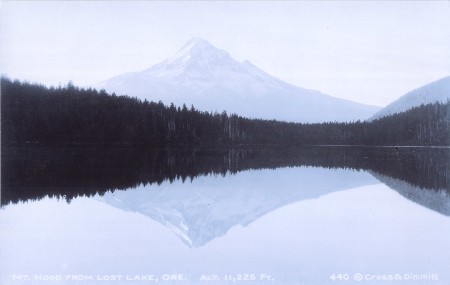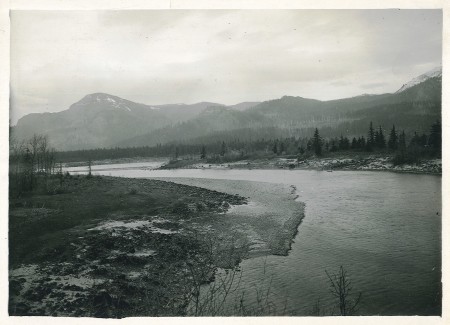“In August of 1873, a party of men from The Dalles made a horseback trip around Mount Hood with John Divers of Hood River as their guide.  They knew the body of water as ‘Big Lake,’ and reached it by following Lake Branch of the Hood River to its source. Arriving at the lake during a typical Lost Lake rainstorm they proceeded to build lean-to shelters by stripping cedar bark from the great trees. On their third night at the lake, while lingering over an evening meal of trout, one of the Diver’s boys said: I wonder if that stuff on those trees would burn?’ and without thinking touched a long strand of dry moss with a red-hot stick he had just used to light his pipe. The moss burst into flame and quickly spread to other trees. They left without stopping to gather their camping gear. Wind swept the fire south and up what was later to become known as Huckleberry Mountain. The purple berries appeared in great number a few years after the fire.
They knew the body of water as ‘Big Lake,’ and reached it by following Lake Branch of the Hood River to its source. Arriving at the lake during a typical Lost Lake rainstorm they proceeded to build lean-to shelters by stripping cedar bark from the great trees. On their third night at the lake, while lingering over an evening meal of trout, one of the Diver’s boys said: I wonder if that stuff on those trees would burn?’ and without thinking touched a long strand of dry moss with a red-hot stick he had just used to light his pipe. The moss burst into flame and quickly spread to other trees. They left without stopping to gather their camping gear. Wind swept the fire south and up what was later to become known as Huckleberry Mountain. The purple berries appeared in great number a few years after the fire.
The story remained a family secret for many years and Lost Lake remained ‘lost’ until its official discovery in 1880 by a group of 11 men from Hood River. Leaving town on August 18th they traveled south to the present site of Dee where they experienced their first adventure. In order to reach the west side of the river they had to fell a large tree and then crawl across to the other side. Their animals were hauled across the river with ropes. Reaching the upper West Fork of the Hood River they found the area completely burned over from a forest fire the year. The soft ash quickly filled their shoes and made travel difficult, but they did eventually reach a point high in the hills where, according to their calculations, the lake should have been. It was not there. One of the party said: We must be lost.’ ‘Oh, no,’ replied Smith, a competent surveyor, ‘we know exactly where we are. It’s like the Indian who said he wasn’t lost-his wig-warn was.’ Continuing southward the men finally reached the take and christened it Lost Lake as a result of Mr. Smith’s remark.”
source: http://reed.edu/csail/Lost_Lake.pdf

 They knew the body of water as ‘Big Lake,’ and reached it by following Lake Branch of the Hood River to its source. Arriving at the lake during a typical Lost Lake rainstorm they proceeded to build lean-to shelters by stripping cedar bark from the great trees. On their third night at the lake, while lingering over an evening meal of trout, one of the Diver’s boys said: I wonder if that stuff on those trees would burn?’ and without thinking touched a long strand of dry moss with a red-hot stick he had just used to light his pipe. The moss burst into flame and quickly spread to other trees. They left without stopping to gather their camping gear. Wind swept the fire south and up what was later to become known as Huckleberry Mountain. The purple berries appeared in great number a few years after the fire.
They knew the body of water as ‘Big Lake,’ and reached it by following Lake Branch of the Hood River to its source. Arriving at the lake during a typical Lost Lake rainstorm they proceeded to build lean-to shelters by stripping cedar bark from the great trees. On their third night at the lake, while lingering over an evening meal of trout, one of the Diver’s boys said: I wonder if that stuff on those trees would burn?’ and without thinking touched a long strand of dry moss with a red-hot stick he had just used to light his pipe. The moss burst into flame and quickly spread to other trees. They left without stopping to gather their camping gear. Wind swept the fire south and up what was later to become known as Huckleberry Mountain. The purple berries appeared in great number a few years after the fire.